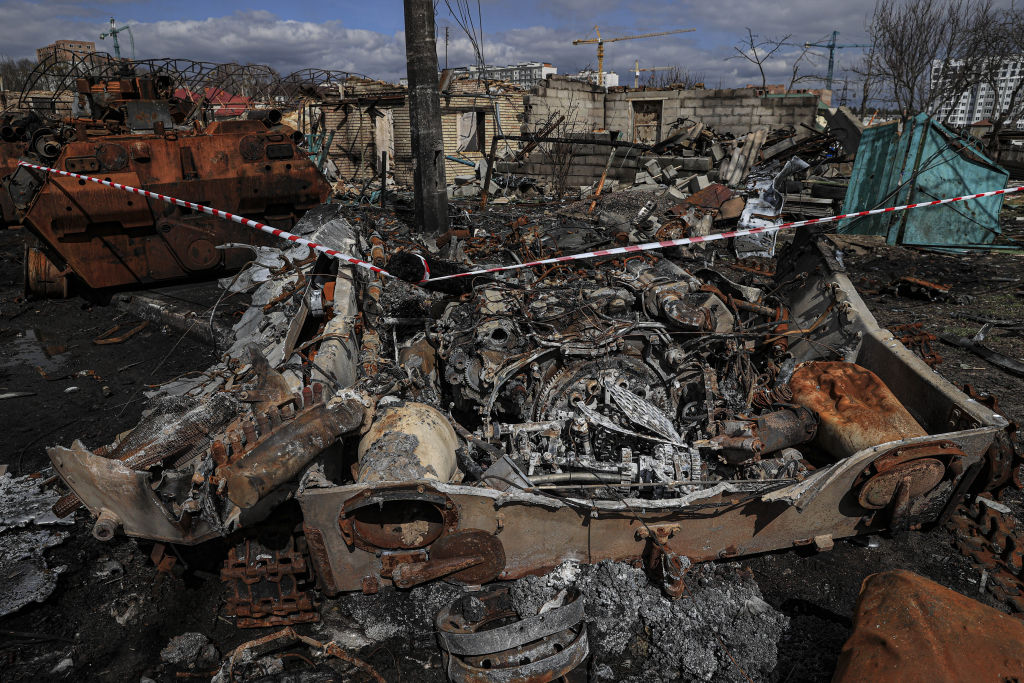Satellite images show bodies in Bucha while Russia still occupied town


A free daily email with the biggest news stories of the day – and the best features from TheWeek.com
You are now subscribed
Your newsletter sign-up was successful
A satellite image analysis conducted by The New York Times appears to disprove Moscow's claims that the massacre in Bucha, Ukraine happened after Russian soldiers had left the town around March 30.
After gruesome images out of Bucha emerged over the weekend, the Russian Ministry of Defense denied responsibility for any of the killings and decried the reports as a "hoax." On Sunday, the ministry even suggested the bodies were placed on the street after Russian troops withdrew, the Times writes.
However, a Times review of video and satellite images shows that "many of the civilians were killed more than three weeks ago, when Russia's military was in control of the town."
The Week
Escape your echo chamber. Get the facts behind the news, plus analysis from multiple perspectives.

Sign up for The Week's Free Newsletters
From our morning news briefing to a weekly Good News Newsletter, get the best of The Week delivered directly to your inbox.
From our morning news briefing to a weekly Good News Newsletter, get the best of The Week delivered directly to your inbox.
For example, when cross-referenced with a video filmed April 2, satellite images provided to the Times showed that at least 11 bodies seen in the April 2 video had been on the street since March 11, "when Russia, by its own account, occupied the town," the Times writes.
More specifically, the images show human body-sized objects on Yablonska Street in Bucha between March 9 and March 11. The objects "appear in the precise positions in which the bodies were found after Ukrainian forces reclaimed Bucha, as the footage from April 2 shows," the Times adds. Further examination reveals the objects were in those positions for more than three weeks.
The situation out of Bucha has so far sparked international condemnation and promises of more sanctions on Russia. Germany and France on Monday expelled numerous Russian diplomats, while President Biden called for Russian President Vladimir Putin to be tried for war crimes.
A free daily email with the biggest news stories of the day – and the best features from TheWeek.com
Brigid Kennedy worked at The Week from 2021 to 2023 as a staff writer, junior editor and then story editor, with an interest in U.S. politics, the economy and the music industry.
-
 Local elections 2026: where are they and who is expected to win?
Local elections 2026: where are they and who is expected to win?The Explainer Labour is braced for heavy losses and U-turn on postponing some council elections hasn’t helped the party’s prospects
-
 6 of the world’s most accessible destinations
6 of the world’s most accessible destinationsThe Week Recommends Experience all of Berlin, Singapore and Sydney
-
 How the FCC’s ‘equal time’ rule works
How the FCC’s ‘equal time’ rule worksIn the Spotlight The law is at the heart of the Colbert-CBS conflict
-
 The mission to demine Ukraine
The mission to demine UkraineThe Explainer An estimated quarter of the nation – an area the size of England – is contaminated with landmines and unexploded shells from the war
-
 The secret lives of Russian saboteurs
The secret lives of Russian saboteursUnder The Radar Moscow is recruiting criminal agents to sow chaos and fear among its enemies
-
 Is the 'coalition of the willing' going to work?
Is the 'coalition of the willing' going to work?Today's Big Question PM's proposal for UK/French-led peacekeeping force in Ukraine provokes 'hostility' in Moscow and 'derision' in Washington
-
 Ukraine: where do Trump's loyalties really lie?
Ukraine: where do Trump's loyalties really lie?Today's Big Question 'Extraordinary pivot' by US president – driven by personal, ideological and strategic factors – has 'upended decades of hawkish foreign policy toward Russia'
-
 What will Trump-Putin Ukraine peace deal look like?
What will Trump-Putin Ukraine peace deal look like?Today's Big Question US president 'blindsides' European and UK leaders, indicating Ukraine must concede seized territory and forget about Nato membership
-
 Ukraine's disappearing army
Ukraine's disappearing armyUnder the Radar Every day unwilling conscripts and disillusioned veterans are fleeing the front
-
 Cuba's mercenaries fighting against Ukraine
Cuba's mercenaries fighting against UkraineThe Explainer Young men lured by high salaries and Russian citizenship to enlist for a year are now trapped on front lines of war indefinitely
-
 Ukraine-Russia: are both sides readying for nuclear war?
Ukraine-Russia: are both sides readying for nuclear war?Today's Big Question Putin changes doctrine to lower threshold for atomic weapons after Ukraine strikes with Western missiles
